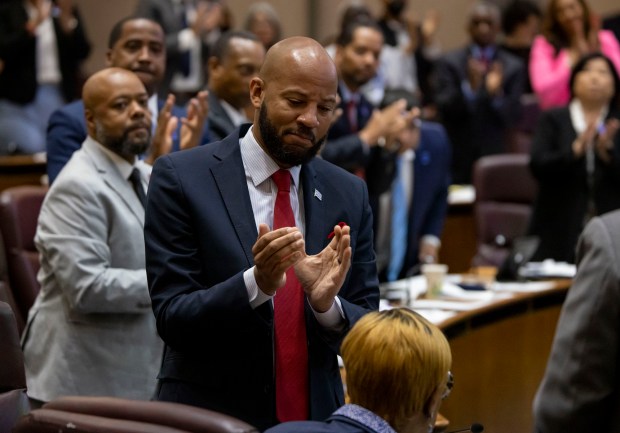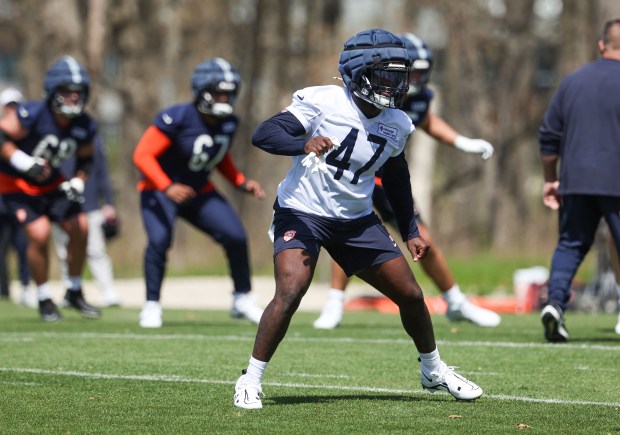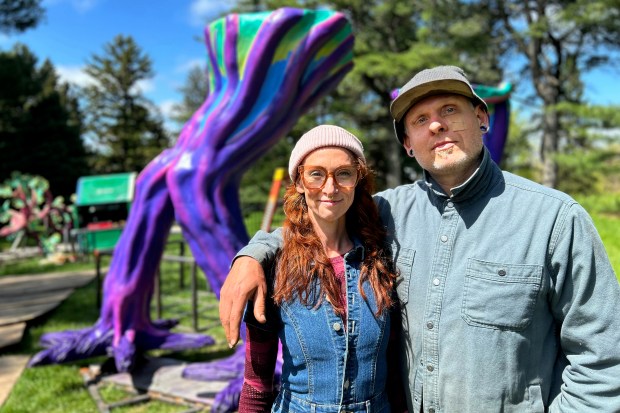Mayor Brandon Johnson appeared set to throw his weight behind a proposal this week to fight chaotic Chicago “teen trend” meetups and illegal parties that sometimes end in gun violence, but backed away from the plan amid progressive pushback.
Aldermen were discussing with the administration Thursday a draft ordinance to levy $10,000 fines against the organizers of certain “unlawful gatherings” — including many of the raucous, social media-fueled get-togethers pulling crowds of young people together at city parks and abandoned buildings.
The mayor’s administration wanted to push the measure through the City Council as soon as next week, Ald. Lamont Robinson, 4th, told the Tribune before it was pulled. The ambitious timeline for the crackdown suggested Johnson feels the need to do something about the parties, which have drawn attention for some high-profile acts of violence.
However, his administration quickly changed its tune in the face of questions from aldermen about its ramifications, and instead planned to hold the draft ordinance by Friday morning. Despite the administration’s intergovernmental affairs team’s work to push the ordinance and its appearance on a council agenda, a Johnson spokesperson said Friday it had moved forward “erroneously.”
“A staffer erroneously submitted a proposal for an ordinance that is currently not moving forward,” the spokesperson wrote. “We will continue to have conversations on the most effective strategies, consistent with the Mayor’s values, to prevent mass shootings.”
Ald. Daniel La Spata, 1st, said he told the administration he would vote no because of the policy’s potential to accidentally crack down on protests, such as the pro-Palestine encampments that popped up at Chicago universities this spring.
“I could foresee it being used against those who would set up encampments to protest against unjust wars. I could particularly foresee how it could be used during the DNC, and that was not something that I wanted to have any part of, to be honest,” the Northwest Side aldermen said.
La Spata suggested Johnson’s team could rework it.
“I can understand the pressure that they are under from alders other than myself, but I I feel like there’s got to be more thoughtfulness,” he said.
The mayor’s administration had planned to introduce the ordinance in the City Council Monday and pass it into law Wednesday, in an apparent attempt to squeeze the legislation in before the council breaks until September. It was taken off a committee agenda Friday afternoon.
The ordinance aimed to target an issue that has rankled downtown, South Side and West Side aldermen: the sudden, sprawling gatherings of young people popping up across the city.
The gatherings have become a fixture of Chicago summers in the last decade, springing up via social media flyers. While organizers in their public invitations share plans to dance, box or make YouTube videos, sometimes the gatherings have devolved into chaos and violence.
The gatherings are just one aspect of what some council members have complained is a broader trend of violent acts committed by young people around Chicago.
Ald. Brian Hopkins, 2nd, unsuccessfully called for an 8 p.m. curfew in June after a group of unaccompanied minors committed an “unprovoked and aggravated assault” against a couple in Streeterville. The attacked woman said the beating she received caused her to lose a baby after two weeks of pregnancy. Hopkins said the city needs to address the “chronic youth gatherings, which have proven to be an incubator for violent and lawless activity.
Violence and large gatherings of young people at the Douglas neighborhood’s 31st Street Beach have led Robinson to request more officers be stationed at the beach and at times close it earlier after a pair of late-June fatal shootings.
“We have been inundated with these ‘take-overs,’” Robinson told the Tribune Thursday, praising the ordinance before it was pulled. “We need to reclaim Chicago’s streets from some of the late night chaos and violence.”
Robinson said Friday morning that he has faith the mayor will amend the ordinance and address the sometimes violent gatherings. Legislation often needs to be reworked to pass, he added. “I think that that’s where we are,” he said.
But after the mayor’s statement suggesting the ordinance had moved forward in error, Robinson said again he had worked with the administration on the legislation, and said it was “surprising” to hear them say they didn’t mean to try to pass it.
Johnson has vowed to not demonize the young people involved when past meetups ended in tragedy. The mayor commended police last August after officers made made 40 arrests during one such gathering. The group gathered in the South Loop then had fought and stormed a convenience store. Still, the mayor took umbrage with the description of the crowd there as a “mob.”
“That’s not appropriate. We’re not talking about mob actions,” Johnson said then. “We have to be careful when we use language to describe certain behavior. There’s a history in this city, and, I mean, to refer to children as like baby Al Capones is not appropriate.”
In recent months, the mayor has touted his efforts to hike the capacity of the city’s teen summer jobs program. Johnson’s administration poured an additional $76 million to add 4,000 “One Summer Chicago” job opportunities.
The jobs-for-teens effort reflects a critical part of Johnson’s view on crime: Many of the young people who break laws are acting out in part because they and their neighborhoods have been underserved by Chicago for decades.
However, Johnson’s typically long-term vision on crime and violence has taken a decidedly more short-term focus in recent days. After more than 100 people were shot, 19 fatally, over the long Fourth of July weekend, Johnson continued to highlight the need to address violence’s root causes, but more sharply called for punishment for those who make “a choice to kill.”
“This is a choice. It’s a choice to kill. It’s a choice to kill women. A choice to kill children. A choice to kill the elderly,” Johnson said at a news conference Monday. “These are choices that the offenders made and they calculated.”
Johnson started a new effort Friday to address citywide violence, hosting his first “Take Back the Block” event near the site of a recent West Side mass shooting. The event brought government officials like the mayor and police brass together in a bid to assure residents they can work with the city to address crime, Johnson spokesperson Ronnie Reese said. It also included efforts to connect people with resources like those of the Chicago Housing Authority and to “clean and green” the neighborhood with much-needed infrastructure fixes.
The ordinance Johnson tabled targeted unpermitted “publicly-advertised gatherings” that occur between 10 p.m. and 4 a.m. Under the legislation, the sponsor of any such event would face a fine “not less than $10,000.”
The city in the past has tried to curb illegal behavior by fining transgressors, efforts that have met with limited success as it is often difficult to track down perpetrators and force them to pay up. Other efforts to hit criminals in their pocketbooks, like Mayor Lori Lightfoot’s 2021 proposal to fine gang members and seize their property, fell apart because of concerns the laws could hurt the wrong people.
Before Johnson’s legislation was tabled, Robinson told the Tribune it was much needed to address both big gatherings in public spots and house parties occurring in abandoned buildings that resulted in violence.
“This is really about holding people accountable. They cannot continue taking over our city and not have any type of sanctions,” he said. “Enough is enough.”
Robinson backed the mayor’s loud calls to give Chicago’s teens and young adults more safe, fun opportunities. He recently hired to his ward office a young man who had been using his massive social media following to organize many of the big gatherings.
The near South Side alderman is hosting a “PeacePalooza” music festival next weekend. The event will feature big-name artists like Chicago rappers Joey Purp and Vic Mensa, but will also promote city resources and even include a session on applying tourniquets for gunshot victims.
“Our young people want to be able to hang out in a safe environment,“ Robinson said. “Chicago needs to figure out ways to meet young people where they are.”
But meanwhile, as teens and young adults from as far away as Indiana continue to come to the chaotic meet-ups hitting his ward, Robinson said he does not think the proposed ordinance is too harsh.
“There is no price for someone’s life,” he said. “We have to get this stuff under wraps.”
jsheridan@chicagotribune.com





